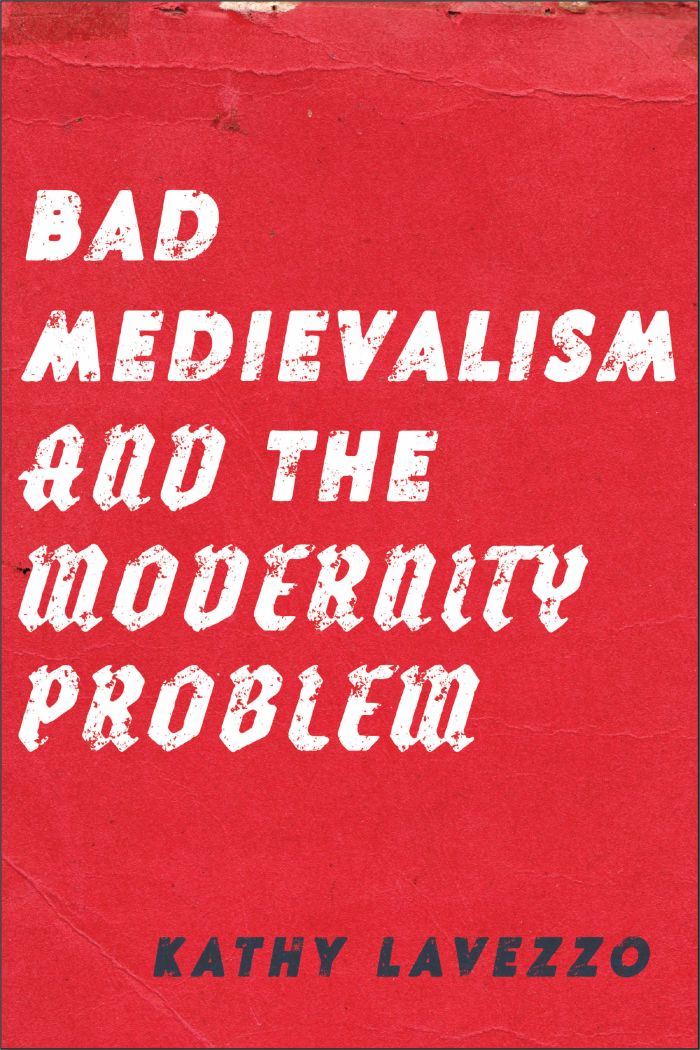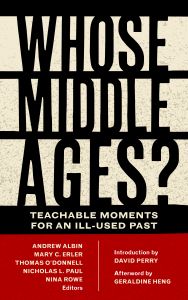Bad Medievalism and the Modernity Problem

This book can be opened with

Challenges the assumptions made over the medieval/modern divide by examining the medieval roots of modern racism
Humanists have long insisted on a chasm separating modernity and the Middle Ages. In Bad Medievalism and the Modernity Problem, Kathy Lavezzo demonstrates how the temporal divide scholars typically accept is a fiction that has shaped racial discourse over a longue durée. The hard line drawn between “then” and “now” is of a piece with the line separating whiteness from humans deemed irrevocably other. Thus, Lavezzo advocates a “bad”—that is, depressing and disturbing, even nauseating—historicism attuned to the interpenetration of race, whiteness, and periodicity in the “west.”
Teasing out the dialectical invocation of both periods by figures as diverse as W. E. B. Du Bois, Carolyn Bynum, Stuart Hall, Johan Huizinga, Paule Marshall, Karl Marx, Gloria Naylor, J. R. R. Tolkien, and Sylvia Wynter, Lavezzo demonstrates how the tension between and across categories of the “medieval” and the “modern” has mobilized intense emotional and political responses.
Inspired by Lavezzo’s discovery that Hall, the beloved founder of cultural studies, planned as a student at Oxford to become a medievalist but was dissuaded from that path by his teacher Tolkien, Bad Medievalism and the Modernity Problem unpacks the implications of that charged encounter. Central chapters contrast Tolkien’s white heritage medievalism with a speculative inquiry into the Piers Plowman dissertation that Hall never wrote.
Other chapters assess the white “feel” of periodization by scholars, including Jacob Burckhardt, Huizinga, Fredric Jameson, and Bynum, and draw on theorists, including Du Bois and Wynter, to chart the medieval roots of a racialized discourse of progress and primitivism. Bad Medievalism and the Modernity Problem culminates in new readings of Gloria Naylor’s Bailey’s Cafe and Paule Marshall’s The Fisher King, demonstrating their importance as productively pessimistic engagements with the racial legacies of both the medieval and the modern.
Why should we care about the Medieval? Perhaps because, as Kathryn Lavezzo so brilliantly illustrates, it is at the core of both how we define the modern and how we must confront modern discourses of power, race, patriarchy, and resistance. Rooted in a close engagement with contemporary theorists of race and modernity, Lavezzo's work manages to both reframe the medieval as an historical time period and to offer a bracing new engagement with contemporary fiction and theories of race. Drawing on medieval studies, contemporary scholarship on race, black feminism, the history of emotions, postcoloniality and afro-pessimism (to name but a few) Bad Medievalism fundamentally transforms how we understand modernity. This book is timely and profoundly important.—Jennifer L. Morgan, New York University
At the heart of Bad Medievalism are the ghosts of Stuart Hall and J. R. R. Tolkien, whose encounter in 1950s England led to the exclusion of a brilliant Black man from the study of English medieval literature, and created the conditions for his subsequent cofounding of the influential Birmingham school of cultural studies. Lavezzo unpacks this critical encounter with acuity and sensitivity, so that it becomes a node in her larger discourse on periodization, affect and emotion, white medieval studies, and medievalism today. We owe the author a debt for her discovery of how English medieval studies was robbed, and modern cultural studies emerged a winner in the western academy, as well as for her superb analysis of J. R. R. Tolkien. Chapter 3 alone is worth the price of the book.—Geraldine Heng, author of The Invention of Race in the European Middle Ages and The Global Middle Ages: An Introduction
Touting the 'benefits of kill-joy historicism,' Bad Medievalism is a wide-ranging exploration of race, affect, and the relations between medievalism and the modern, joining broad survey with readings of Gloria Naylor and Paule Marshall's rewritings of medieval materials and brilliantly highlighting a fascinating key encounter, when J. R. Tolkien discouraged his student, Stuart Hall, the future founder of cultural studies, from pursing graduate work in medieval studies. An Impressive achievement.—Jonathan Culler, Cornell University
Do the Middle Ages get you down? Kathryn Lavezzo explains why in her stunning study of medievalism’s negative vibes, from its racial complicities and alt-right revivals to the critical pessimism that can fortify medieval studies for our times. Stuart Hall is the hero of this brilliant new account of periodization, the invention of modernity, and the structures of scholarly feeling.—Julia Reinhard Lupton, University of California, Irvine
Kathy Lavezzo's Bad Medievalism is an utterly compelling intervention into medieval studies. The book combines sophisticated critiques of certain idioms of feeling and affect in medievalist scholarship with rigorous inquiries into the politics of periodization and race shaping the field. Rich with insight and brilliantly conceived, the book will inspire discussions about the past, present, and future of medievalism for years to come.—Bruce Holsinger, Linden Kent Memorial Professor of English, University of Virginia
An interesting and important contribution to the field of Medieval Studies, as well as the intersections of that field with critical theory, including Critical Race Studies. It will appeal to both specialists in the field and a wider public with an interest in the histories of race and racialization.—Suzanne Conklin Akbari, Institute for Advanced Study, Princeton, NJ
Periodization structures how we feel and who we are. Powered by this insight, Lavezzo assembles a remarkable archive of thinkers who together aid in reconceptualizing historical difference and in feeling the medieval/modern boundary anew. Antiracist critique joins creative and speculative practice in this exciting study, to generate new possibilities for medieval studies.—Julie Orlemanski, Department of English, University of Chicago
Preface | vii
Introduction: Race, Affect, Periodization | 1
Part I: White Mythologies of History
1 Modernity, the Medieval, and the Feel of Periodization | 37
2 “Between Then and Now”: The Veil of Periodization | 76
Part II: Tolkien vs. Hall: White Heritage Fantasy and Diasporic Critique
3 Whiteness, Medievalism, Immigration: Rethinking Tolkien through Stuart Hall | 109
4 Stuart Hall’s Piers Plowman | 141
Part III: Black Feminist Modernism, Black Feminist Medievalism
5 High Theory, Low Feelings: Gloria Naylor’s Bailey’s Cafe | 181
6 Tradition and the Individual Black Talent: Contesting Malory and Modernism in The Fisher King | 216
Acknowledgments | 249
Appendix: Stuart Hall’s First Publication | 253
Notes | 259
Index | 323


